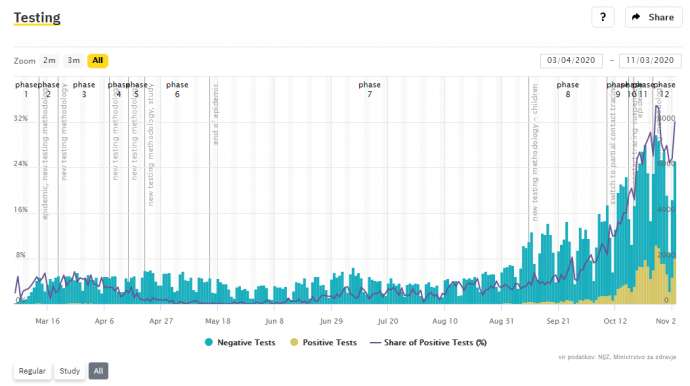STA, 4 November 2020 - Slovenia has recorded a new uptick in daily coronavirus infections with 2,027 of 6,311 tests performed on Tuesday returning positive results, or as many as 32%. The country also reported 29 fatalities, a new daily high, according to government data.
Despite a new increase in daily cases (the last time the country recorded over 2,000 cases was on 28 October), government spokesman Jelko Kacin noted that the reproduction number kept falling, which he labelled as a valuable and encouraging piece of information.
The R0 number fell to 1.14 on 3 November, from 1.17 on 2 November and 1.21 on 1 November with Kacin projecting it will reach a point when one infected passes on the virus to just one other person in three to four days.
So has the incidence per 100,000 residents been halved to an average 535 a day over the past seven days, compared to 1,120 over the past 14 days, as of 2 November, which Kacin said showed the measures taken by the government and put into practice by the people had borne fruit.
However, the situation in hospitals remains very serious, said Kacin, who echoed PM Janez Janša's warning last night that the situation would remain serious for at least a month longer.
Covid-19 hospitalisations have increased to 979, up by 54 from the day before, with 158 patients now in intensive care units, twelve more than the day before. Sixty-three patients were discharged home yesterday.
Kacin also presented charts showing an increase in hospital admissions. Yesterday, there were 57 new admissions per million residents, discounting discharges and fatalities.
Still, Robert Carotta, the coordinator for Covid-19 hospital beds at the Health Ministry, said there were enough hospital beds and equipment, the main problem was staff, especially intensive care staff, but even that "is sustainable" for the time being.
"Compared to other countries in Europe, Slovenia is coping excellently with the epidemic. Regardless of the fact that we had one of the steepest growth in Covid-19 infections, Slovenian healthcare is working and everyone who needs care gets it," said Carotta.
Similarly, Bojana Beović, the government's chief Covid-19 adviser, commented yesterday that despite the large number of patients needing hospital treatment, "we have not had the chaos seen in Italy or Belgium", which she said was thanks to excellent staff.
Health Minister Tomaž Gantar, who also addressed the government press briefing today, said the health system had adapted exceptionally well to the new situation as regular services were being scaled down to make space for Covid-19 patients.
Offering some figures, he said the number of Covid-19 hospital beds had been expanded from 227 regular and 54 ICU beds on 16 October to 821 and 150, respectively, and the number of testing points had expanded from 16 in the first wave to 50 with more being added.
The providers have been urged to increase ICU beds by a further 100 over the next ten days, as the number of Covid-19 patients is expected to keep increasing over the next few weeks.
Gantar said this meant lockdown restrictions could not be eased yet. "Until the need for new admissions is higher than the number of patients discharged, it makes no sense talking about easing the measures," he said.
To scale up testing, the ministry has formed a taskforce which has approved 17 to 19 rapid antigen tests and based on their availability in the market, the ministry can secure enough to test employees in critical services on a regular basis, to detect even asymptomatic cases.
The ministry would also like to allow testing within 24 hours to persons that are showing symptoms or have been in contact with the infected. Gantar said more than 10,000 such tests could be ordered in a matter of days.
A mass testing using rapid tests is "a realistic option, almost a necessity", Gantar said about the possibility of mass testing hinted at by Janša a while ago, but he said the priority was those employed in the critical infrastructure.
The country's coronavirus case count has increased to 39,410, with an estimated 23,417 cases still active, according to tracker site covid-19.sledilnik.org, which puts the rolling 14-day average per 100,000 residents at 1,117 as of 3 November.
A total of 441 patients with Covid-19 have died.
All of our stories on Slovenia and coronavirus







